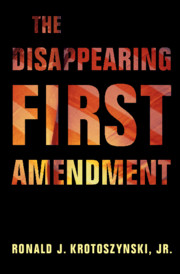Book contents
- The Disappearing First Amendment
- The Disappearing First Amendment
- Copyright page
- Dedication
- Contents
- Preface
- Acknowledgments
- Table of Cases
- 1 Two Steps Forward, One Step Back
- 2 The Public Forum Doctrine and Reduced Access to Government Property for Speech Activity
- 3 The First Amendment As a Source of Positive Rights
- 4 Whistleblowing Speech and Democratic Accountability
- 5 Shedding Their Constitutional Rights at the Schoolhouse Gate
- 6 Transborder Speech
- 7 Systemic Failures to Protect Newsgathering Activities by Professional Journalists and Amateur Citizen-Journalists Alike
- 8 The Citizen As Government Sock Puppet and the State Masquerading As a Citizen
- 9 Using Constitutionally Permissible Statutes to Impede First Amendment Activity
- 10 Conclusion
- Notes
- Index
6 - Transborder Speech
Using the Accident of Geography As a Makeweight Justification for Suppressing Expressive Freedoms
Published online by Cambridge University Press: 02 August 2019
- The Disappearing First Amendment
- The Disappearing First Amendment
- Copyright page
- Dedication
- Contents
- Preface
- Acknowledgments
- Table of Cases
- 1 Two Steps Forward, One Step Back
- 2 The Public Forum Doctrine and Reduced Access to Government Property for Speech Activity
- 3 The First Amendment As a Source of Positive Rights
- 4 Whistleblowing Speech and Democratic Accountability
- 5 Shedding Their Constitutional Rights at the Schoolhouse Gate
- 6 Transborder Speech
- 7 Systemic Failures to Protect Newsgathering Activities by Professional Journalists and Amateur Citizen-Journalists Alike
- 8 The Citizen As Government Sock Puppet and the State Masquerading As a Citizen
- 9 Using Constitutionally Permissible Statutes to Impede First Amendment Activity
- 10 Conclusion
- Notes
- Index
Summary
This chapter will consider an overlooked and underappreciated subset of First Amendment activity: transborder speech. Transborder speech involves the exercise of freedom of speech, assembly, association, press, and petition across national borders; it relates to the global information flows of ideas, knowledge, and argument and the various forms of interpersonal engagement among and between individuals that facilitate knowledge and understanding. Simply put, in the age of the internet, the marketplace of ideas does not respect national boundaries.1 Even though transborder speech constitutes an increasingly important aspect of expressive freedom, it enjoys considerably less protection than purely domestic speech activity.2
If the value of information and ideas is not a function of its source, as the Supreme Court explained with great force in Citizens United,3 then it necessarily follows, as a matter of constitutional logic, that the locus of speech activity should be equally irrelevant to ascertaining the value of particular speech to the marketplace of ideas – or to the process of democratic self-government.4 Professor Timothy Zick argues that we “ought to treat American citizens’ rights to engage in speech, assembly, petition, and press as fully portable.”5 Nevertheless, as Professor Burt Neuborne and his co-author, Steven R. Shapiro, observed in 1985, “[r]ecent case law hardly encourages optimism about the prospects for close judicial scrutiny of impediments to the flow of information and ideas across the national border.”6 Moreover, from the vantage point of the Reagan era, “the trend probably points in the opposite direction.”7 Subsequent judicial developments have entirely borne out this baleful prediction.
- Type
- Chapter
- Information
- The Disappearing First Amendment , pp. 121 - 150Publisher: Cambridge University PressPrint publication year: 2019



